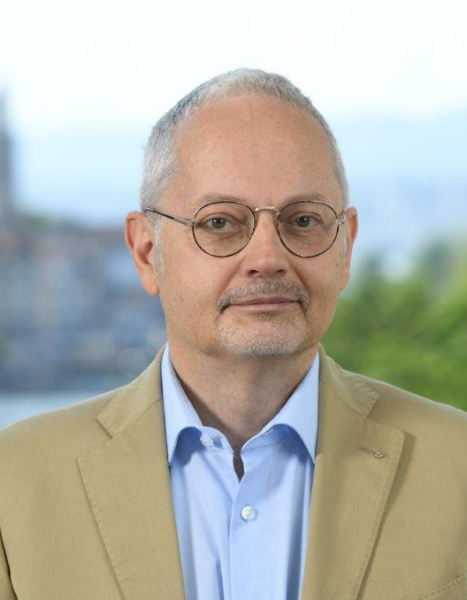Interview with Prof. François Degeorge

Prof. François Degeorge is Managing Director and Senior Chair of the Swiss Finance Institute (SFI), which aims to build academic excellence in banking and finance in Switzerland, thereby generating knowledge capital for the financial centre. The SFI pursues this objective by supporting academic research, PhD education, and industry-oriented activities (Master Classes, roundtables, and conferences) that foster an active exchange between academia and industry. SFI professors teach in Bachelors and Masters programs in their partner universities. The SFI’s founders are the Swiss banks, the Swiss Stock Exchange (SIX) and its partner universities.
François, What role does sustainable finance play in the research and education activities of the SFI?
Sustainable finance is one of the most active areas of research of SFI professors and PhD students. SFI is internationally recognized as one of the most influential centres in the world for sustainable finance research. One of our recent SFI PhD graduates was hired by Harvard Business School on the strength of his PhD thesis on sustainable finance. On the education side, several SFI Master Classes discuss climate and biodiversity risks in depth, as well as their implications for sustainable investment and lending.
Can you name some of the most critical unsolved research questions in the field of sustainable finance?
Biodiversity is emerging as a key topic. SFI researchers have just published a pioneering study showing that investors have begun to price biodiversity risk. These results raise fascinating questions: how will companies transform their business models to mitigate biodiversity risk? Should climate strategies be revised to factor in biodiversity? For example, wind and solar facilities have been accused of disrupting ecosystems. There is still much that we need to learn.
In a recent NZZ article you stressed the importance for corporate leaders to base their sustainability and climate strategies on facts not values. Do you think current activities in Switzerland are not facts-based enough?
During the 2010s, corporate leaders around the world have become increasingly aware of climate risks. At the same time, policymakers have been slow to rise to the challenge, especially in the United States. In frustration, in 2019 the U.S. Business Roundtable issued a landmark statement proclaiming a move away from an exclusive focus on shareholder value toward broader societal objectives, including the environment. This was such a monumental shift that corporate leaders felt the need to justify it on moral grounds. Many companies started to frame the fight against climate change as a moral obligation. Even the Financial Times has stuck a “Moral Money” label on its content related to sustainability.
This well-intentioned shift has led to a growing backlash against ESG and accusations of “corporate wokism.” In my view the backlash was predictable. The transition to a sustainable economy will hit some sectors hard. For the losers of the energy transition, a moralizing discourse adds insult to injury. Moreover, framing climate change from a moral standpoint shifts the discussion from objective facts to the subjective terrain of personal values and opinions, and thereby legitimizes climate change sceptics and deniers.
There are many good, pragmatic reasons for companies to address the climate change challenge. Fortunately, in Switzerland pragmatism has largely prevailed. We see a flourishing of entrepreneurial and policy activity related to sustainability. Occasionally, I notice some moralizing tones in company discourse on sustainability. I hope that corporate leaders eventually realize that moral lectures on sustainability are ineffective, and possibly counterproductive.
How can academic research support both companies and financial intermediaries in developing credible and viable strategies in line with national climate goals?
The success of climate strategies depends on a deep understanding of the economics of the climate transition. The research of SFI professors and PhD students has shed light on key topics. Among others: the strengths and weaknesses of sustainability metrics; the effect of fund flows on the performance of sustainable assets; the impact of mandatory carbon emissions reporting; the shift from brown assets in regulated sectors to shadow banks and less regulated countries; and the use of artificial intelligence in climate risk assessment. By drawing on this academic expertise, decision-makers can form well-founded, fact-based climate strategies.
What is your relationship with Swiss Sustainable Finance (SSF) and where do you see the biggest synergies going forward?
First and foremost, we maintain a friendly relationship with SFF, which is strengthened by our common core objectives, namely the strengthening of the Swiss financial center. We see considerable synergies in our joint efforts, such as our joint Sustainable Finance Conference, which will be held in Zurich for the fourth time on September 5, 2024. This collaboration is a prime example of how the academic expertise of the SFI faculty can be brought together with the practical needs of the Swiss financial landscape.
What are the most important advances that the Swiss financial centre has made in the area of sustainability over the last 10 years and to what extent do you think SSF has contributed to this?
The topic of sustainable finance is now well established in the financial sector, and the Swiss financial industry is making an important contribution to the transition of the real economy towards a sustainable future. The increased awareness of this issue among all stakeholders in the Swiss financial industry has in particular been promoted by the various SSF initiatives and SSF has thereby made an important contribution to changing perceptions over the last ten years.
April, 2024
